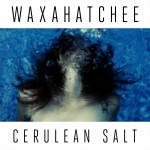Punk rock is dead, punk rock is dying, punk rock died surviving.
In a year when the genre threatens to crash at full throttle back into the mainstream (or at least pseudo-mainstream), from the anguished roar of Pissed Jeans to the wheezing desperation of Iceage, the quieter anguish of Waxahatchee’s “Cerulean Salt” could easily be overlooked as a folksy interlude. But punk has never purely been about noise; Waxahatchee’s whispered riffs invite closer listening, and, true to its themes, the closer one gets, the deeper it cuts.
Helmed by former P.S. Eliot punk rocker Katie Crutchfield, Waxahatchee’s debut, 2012’s “American Weekend,” was a breakup-fueled acoustic album that echoed the poetics of Sharon Van Etten more than the declaratives of Corin Tucker.
But proving once again that there’s no such thing as a “reformed punk,” the follow-up finds Crutchfield plugging back in, outfitting the band with a tightly wound rhythm section and a taste for acidly sweet distortion.
Keeping the confessional lyricism but fueled by a new (or revived) freneticism, “Cerulean Salt” reaches such angst-ridden momentum that it would approach emo if it weren’t so carefully considered.
Indeed, with Crutchfield’s warbling delivery and economical guitar strums, not to mention her gift for sweet but ragged choruses, 13 melodies in 30 minutes would quite suffice. Instead, it’s also a writer’s album, an evocative portrait of fragility and perseverance, misery and mission.
Much of this attention to craft stems from Crutchfield’s songwriting experience – she started playing gigs with her twin sister Allison when they were just 14.
It’s especially fitting, then, that the album’s second track, “Dixie Cups and Jars,” contains a sort of writer’s statement: “I’ll write a tragic epilogue, and you’ll act it out.” It’s not the last lyric to refer to writing, but it’s the most revealing, placing the filter of her own craft on the rest of the album.
This filter makes the album at once utterly personal and curiously deliberate. This is most apparent on “Swan Dive,” the album’s best track, a gorgeous and complicated consideration of love and loss. Sure, it romanticizes misery and validates sorrow – and why not, sadness is universal – but the real confession is here: “I will grow out of all the empty words I often speak/ And you will be depleted but much better off without me.” All this at the prodding of a nervous rhythm, as if the thought’s throbbing at the temples – it’s as heartrending and honest a breakup song as adolescent angst could possibly muster.
But the album is hardly a wallow in miserable tales. In tracks like “Waiting,” “Lips and Limbs” and especially “Coast to Coast,” there’s a palpable forward momentum that belies the content and pushes ever onward. In “Coast to Coast,” the main inspirational thrust of the album is stated plainly, with appropriately shaky pronunciation: “I’ll try to embrace the lows.” And to lend support to this ideal, an irresistible “ooh ooh” chorus pushes forward like an arm around the shoulder.
Given the amount of lows detailed in “Cerulean Salt,” that the album never shatters under the weight of its own fragility is a testament to its craft and sincerity. Waxahatchee never pretends to unravel any mystery of life, but sometimes an honest look at the mystery itself can push it away, if only temporarily. That Waxahatchee manages to do this with short bursts of catchy emotion and single-minded expression is nothing short of remarkable. Simple (but never simplistic) melodies fight the fears away – a punk ethos if there ever was one.

An enjoyable listen.